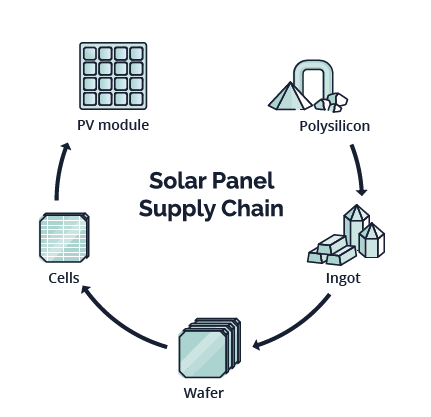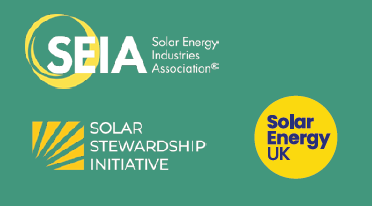NESF has developed a market-leading approach to managing supply chain Sustainability and ESG Risk
Some of the most material risks NESF faces are the environmental and social challenges embedded within the solar and energy storage supply chain. During the last 12 months, this has been a key focus area for NESF while it has developed its market-leading approach to identifying and managing supply chain Sustainability and ESG risk.
NextEnergy Capital’s Construction and Procurement team, ESG team, and Investment team work collaboratively both towards stronger internal supply chain risk management, and to support industry-led initiatives aiming to make the solar and energy storage sector more resilient.
This is crucial, given the supply chain includes potential Sustainability and ESG risks relating to the local environment, raw material extraction, climate issues and carbon emissions, human rights and labour practices, and governance and transparency issues. These are discussed throughout this report, in particular in the context of social and human rights in section 8. However, NESF considers all aspects of supply chain Sustainability and ESG as part of its investment and management processes. The NESF approach to these will continue to be developed and explained in future reporting.
A breakdown of the risks and opportunities relevant to NESF which have been considered to date as part of investment, operational activity and supply chain management is provided below. These risks may change and future reporting will be updated accordingly.
Responsible sourcing and supply chain
A key focus for NESF during the last year has been addressing the risk of social and human rights abuses in its supply chains, with broader environmental and governance considerations also taken into account. NESF has developed a detailed approach to screening and engaging with key supply chain partners, such as solar panel and battery manufacturers, in response to concerns about the sustainability of their operations. This includes collaborating with other third-party experts to learn from best practice in other industries.
Rapid progress is being made in the industry, which will help ensure that NESF can meet its commitments to responsible sourcing. More broadly, supply chains are changing as capital is directed to new investment and manufacturing destinations in response to global events. NESF aims to identify how it can increase its supply chain resilience, working with industry and other partners, to minimise supply chain risk. NESF intends to assess the potential impact of issues such as carbon pricing, the availability of critical minerals, and new policy and legislation under development in the jurisdictions in which it operates.
The NESF approach to ensuring supply chain sustainability is based on three principles:
- Ensuring supply chain policies meet and exceed relevant national and international standards.
- Carrying out comprehensive due diligence and detailed engagement with supply chain partners.
- Supporting industry action to drive best practice and learning from other supply chain experts.
More detail is provided on these below:

Supply chain policy and disclosures
The solar and energy storage supply chain includes potential risks relating to the local environment, human rights and labour practices, the climate and other impacts associated with raw material extraction, and governance and transparency. To date, NESF’s work has focused on addressing potential human rights issues, although all aspects of supply chains are considered as part of the investment process.
NESF respects fundamental social and human rights principles, and expects the same across its business relationships, including its supply chain. NESF publicly commits to the highest supply chain standards, and makes extensive disclosures relating to its Sustainability and ESG policies, which include a Human Rights Position Statement, Code of Conduct for Suppliers, and Sustainable Investment Policy. These are aligned with the requirements of international ESG performance standards, such as the OECD Guidelines for Multinational Enterprises, and the UN Guiding Principles on Business and Human Rights. NESF opposes any form of slavery and forced labour, and publishes an annual Modern Slavery Statement.
Solar Stewardship Initiative and industry Statements to which NESF is a signatory
The NESF Investment Adviser NextEnergy Capital is a sponsor of the Solar Stewardship Initiative. It is also a signatory of the Solar Energy UK Supply Chain Statement, the Solar Energy Industries Association (SEIA) Forced Labor Prevention Pledge, and the SSI Joint Industry Endorsement Statement, and monitors the development and implementation of relevant legislation. This includes, for example, the EU Corporate Sustainability Due Diligence Directive, which is currently being developed by the European institutions.

